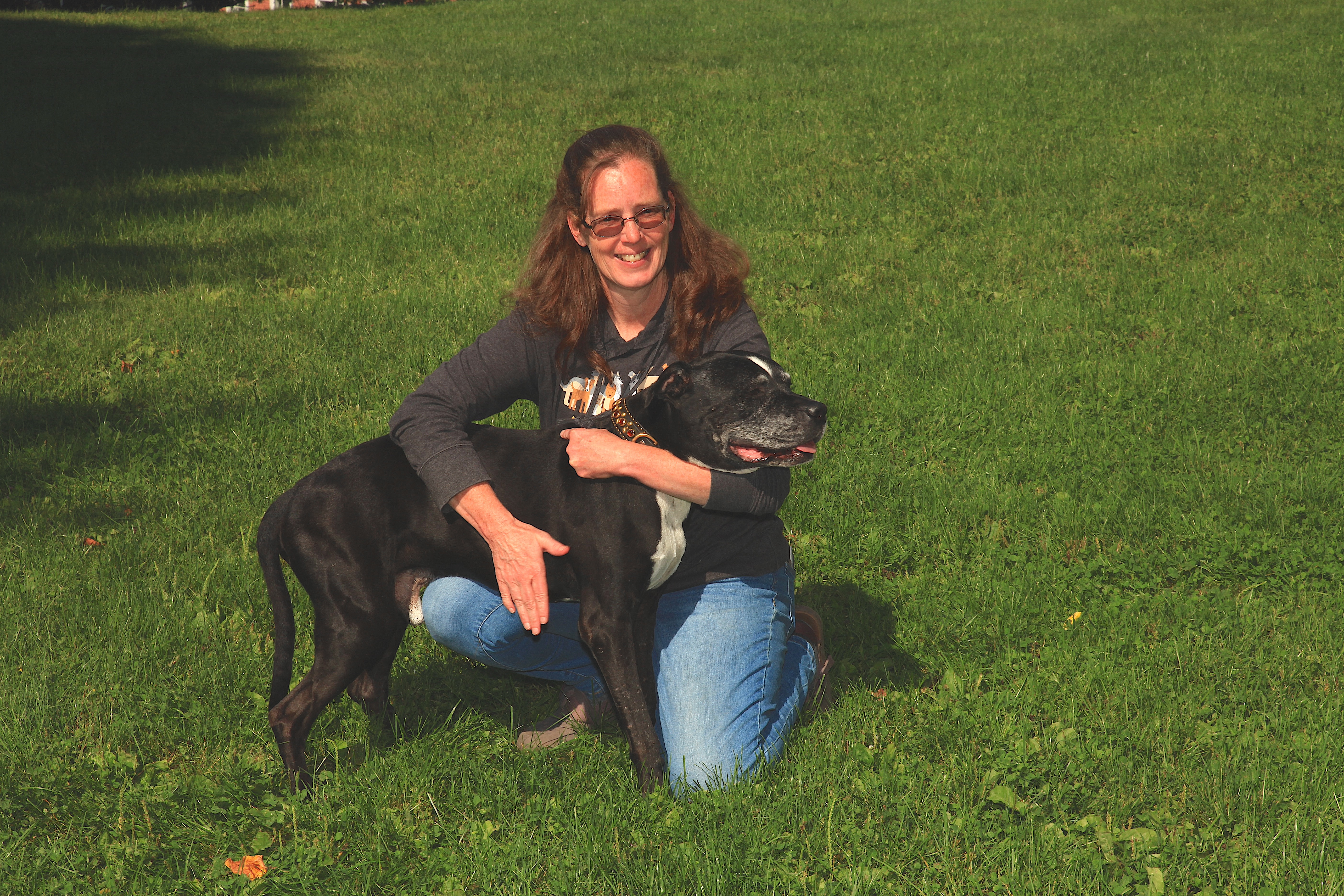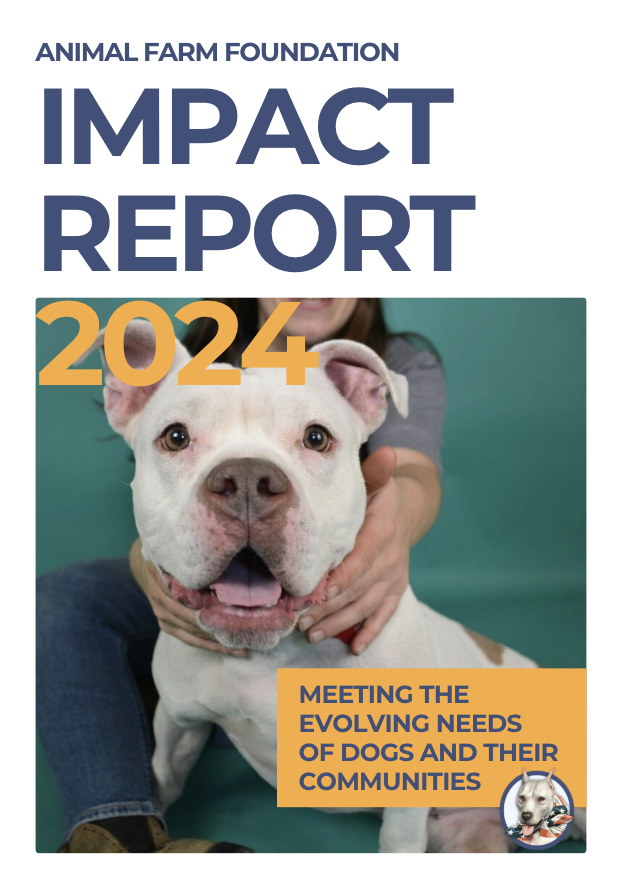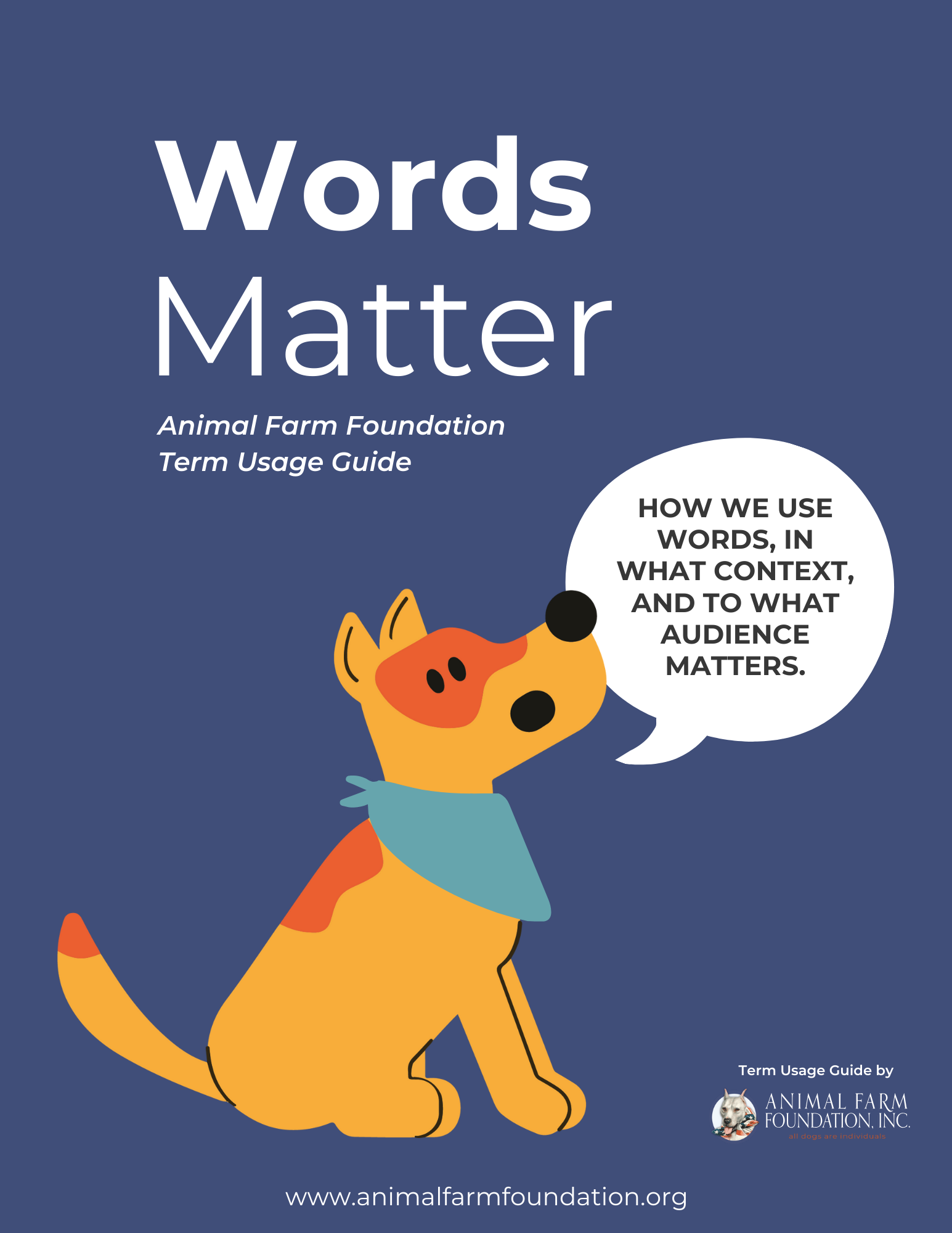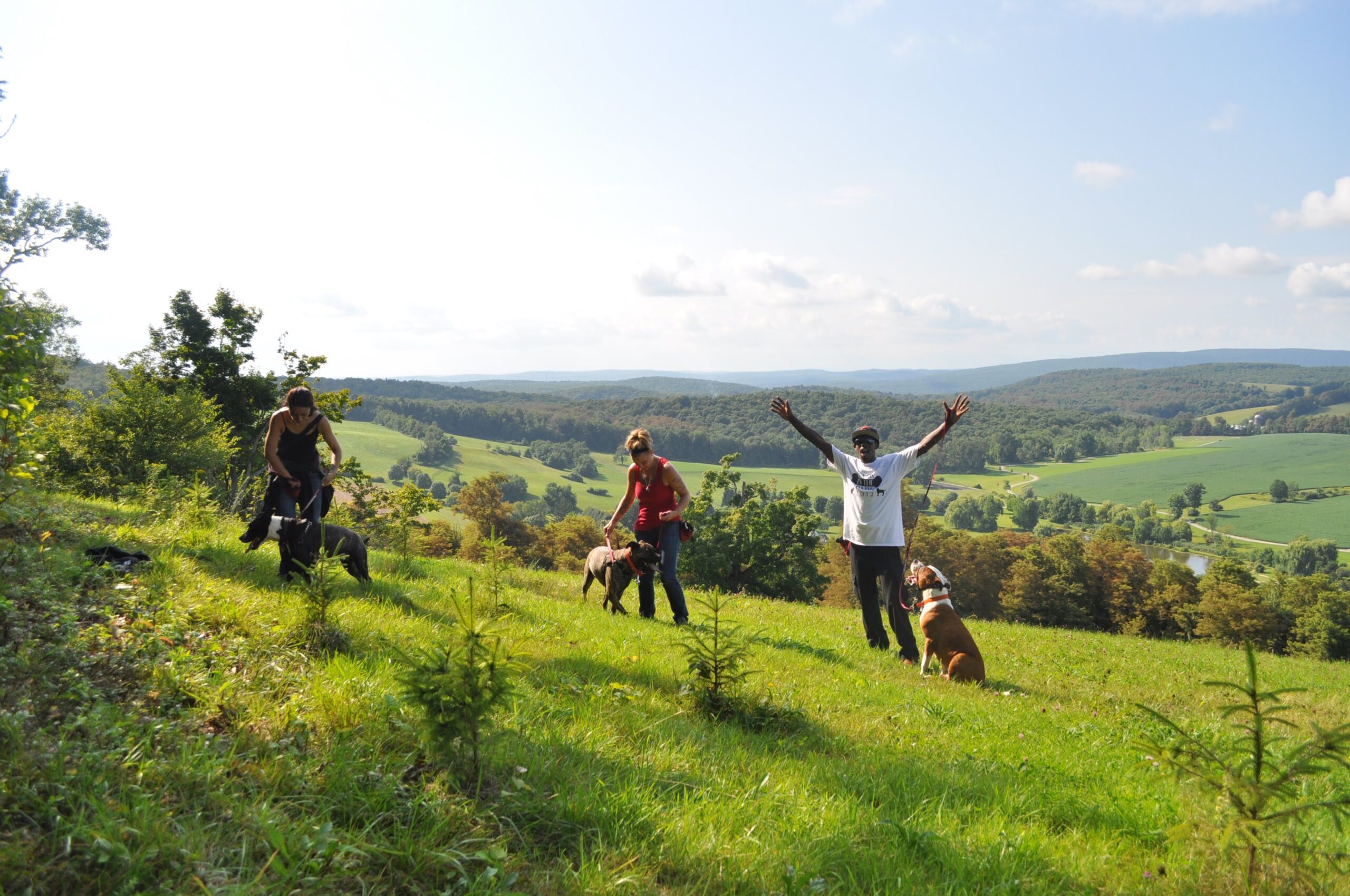One of the things that we do at Animal Farm Foundation is to provide the resources to pay for attorney’s fees for individuals who are suing their municipality over breed-specific legislation.
Right now, in Sioux City, Iowa, there is a lawsuit alleging that the city’s breed-specific ban violates their rights to due process and equal protection and that no rational basis exists for the ordinance’s enactment or existence.
LISTEN TO THE EPISODE
In this episode of the Individual Animal, we talk with attorney Gene Summerlin who is representing the dog owners in the case. Gene discusses the problems with visual breed identification and the vagueness of the law, as well as what might make the law unconstitutional.
It’s an important listen for anyone interested in standing up for dogs and people.
Want to be on our podcast to talk about the intersection of animal welfare and social justice? Want to yell at us for our opinions? Email us!
The Individual Animal is available on iTunes, Stitcher, Spotify, Google Play, and wherever you listen to podcasts.
Regina [00:00:00] Hi and welcome to the Individual Animal a podcast about dog, people and discrimination. I’m Regina and Nikki is here today. Stacey Coleman our executive director is with us but we also interview a special guest. Stacey, why don’t you tell everybody who interviewed and why. Stacey [00:00:18] Hi guys. Stacey here, so we talk with Gene Summerlin. He is the attorney who is representing dog owners in Sioux City, Iowa. One of the things that we do at Animal Farm Foundation is we provide the resources to pay for attorney’s fees associated with suing your municipality so that you can keep your pet. There is still an archaic practice even though it is waning and is not increasing, breed specific legislation is on the decline but in some cities and towns it is still not only in place but it’s also enforced. And if you want to read more about what’s wrong with breed specific legislation it’s arbitrary and arbitrariness we can put a link up to send you to the website to read more about it. But specifically with the lawsuits that we help to fund is if we are contacted by dog owners where their pets have been taken away from them or are being threatened to be taken away we work with Gene and his firm to protect the pets and keep the families together. A couple of years ago we were contacted by a family in Sioux City who had their pet dog taken away and it was really a it was really heartbreaking because the mother said to us and our correspondents, “How do I explain this to my kids that their dog didn’t do anything but the government that I’ve taught them to respect can just come and take their pet away. How do I explain that to my children,” to which my answer to that is I have no idea how to explain that to anybody but we can help you fight it. So fortunately for this particular family they have the resources and the wherewithal to move out of Sioux City find work in another town and just move their families. But a lot of people can’t afford to do that or don’t have that option. And those are the people that we want to help to keep their pets or get their pets back or prevent this from happening to other people who live in their same town or in Sioux City. You can read more about the case. We’ve already got the experts interviewed depositions collected and all of that is available for you to see at SiouxCityLawsuit.org. And we’ll put a link up to that in the podcast notes. But it’s really worth your time to go read the depositions of the people who of course the experts that we presented are there just in arguable the points they make. The credentials they bring to it. There’s just no arguing with the fact that BSL is unconstitutional. But I really hope that you will take the time to read the depositions and the interviews with the experts for which there was one. Well, two maybe like one and a half can be honest. so they had two. And then one was going so badly they just kind of stopped the line of questioning in the middle of it and made it about something else. But you can read those interviews with their experts and also really importantly are the depositions from the people who work at or who have worked at Sioux City Animal Control. So one of the things that we talk about often is that animal controls are tasked with a sometimes impossible job. And that’s even in the towns without breed specific legislation but in a town with breed specific legislation nice. Also our tasking people who are overworked and probably wish they had more training than they did to enforce a law that is arbitrary and impossible to enforce constitutionally anyway. So it’s well it’s tough to read the depositions because from a human point of view I feel I feel badly for the people who are forced to be in that position. But you’ve come to understand how little skill or experience or knowledge they actually bring to the jobs they’ve been tasked with doing. And plus you should read the interview with Cindy K who is the person who is paid. She’s a paid contractor by Sioux City to run animal control her deposition interview is just going to make you want to scream at your computer. It’s very very frustrating. So I hope you listen to the interview with Gene. A couple of things to note about what we do in Animal Farm is we do not ever sue for damages. So the dog owners that we represent to challenge the law, they want to do it to make a greater good change so nobody gets to sue for damages. We just get to sue for getting the law changed. I can explain a little bit more about that and I don’t know what am I missing. What else should we tell everybody before they listen to Gene? Did you get your legal dictionary ready? Sometimes there’s words that are big. So you’re not familiar with the legal language you have to look them up like I did! So I hope you will take some time to look at our website that is dedicated to this particular case in Sioux City. It’s SiouxCityLawsuit.org. And Sue is spelled s i o u x and listen to our interview with Gene. It’s interesting and I’ll help you maybe articulate why it is that breed specific legislation is so wrong headed so enjoy it and let us know if you have any questions. Email us let us know what you think. Stacey [00:06:03] So thank you so much for joining us today. Gene, tell us a little bit about your firm and what you do normally for us. Gene [00:06:15] OK. So I’m an attorney with Hucsh Blackwell law firm with offices in about 18 cities. We’ve got about 700 lawyers. I am the head of our food and agri-business litigation group and ended up in that position because I was an animal science major in undergrad and went to law school and did some work postgrad in genetics. And since then have kind of been involved in various litigation matters that involve scientific topics a lot of it focuses on epidemiology and genetic issues. Stacey: [00:06:50] And that is exactly why when we were researching who we had hired to help challenges BSL we found here and thought you were great. So for our listeners who aren’t familiar with it yet. And one of the things that animal farm does is help owners who file a lawsuit in their hometowns to challenge breed specific legislation so that their pet are not taken away from them. Gene and his crew have been helping us with a case in Sioux City Iowa where we’re challenging the city of Sioux City because they have breed specific legislation and if you don’t know what that is that means that it’s legal for the government to come in and take their dog away just because of what it looks like and not because of any particular behavior or even a pedigree or an opinion of how a dog looks so the reason we hired you because you have so much experience with genetics so could you explain to us how what you know about epidemiology and genetics applies to this particular case that we’re running. Gene [00:08:07] Sure, So if you think about breed specific legislation and you know what a governmental role is in terms of regulating why you can have this kind of dog or that kind of dog it all comes back to public safety. Right? So if you have a city like Sioux City that says we’re going to pass an ordinance that’s going to prohibit a certain type of breed or a certain type of dog. The rationale for them doing that is to say well we want to we want to increase public safety which is another way of saying like we want to reduce dog bites within our population. So when you talk about breed specific legislation there there are really two key scientific issues that form the basis for saying well if we pass this kind of legislation that’s going to assist us in protecting our populace. One is the idea that there is a predictive value between a given breed and its dangerousness to people so aggressiveness or propensity to bite. And then secondly because we know that the majority of the dog population in the United States is not made up of purebred dogs that we can say you know these are all of a specific breed. They’re primarily mixed breed dogs. So a second aspect of Breed Specific Legislation is this idea that we can look at a mixed breed dog and just using its phenotype. So what it looks like. Right. We can tell what breeds make up that dog or what the predominant breed of that dog is. Well those two points are actually the primary reason why BSL or breed specific legislation is scientifically invalid. Number one we know now that there’s really no correlation or predictive value between a dog’s breed and its behavior in the sense that it’s going to be more likely to be aggressive or have a greater propensity to bite. And then secondly we know that even people that have been trained and have experience in dealing with dogs are wrong more often than not when they attempt to identify the primary breed of a dog of a mixed breed dog that’s of unknown origin. So you know you look at a dog and say well you know I look at this dog and based on its body size and maybe its hair color or spotting or lack of spotting the size of its face its nose the length of its legs you know the the hair code and whether it’s long or short straight or curly and I’m going to say OK I will I’m gonna predict that this dog is primarily breed X. If we go back then and do DNA analysis on that particular dog. Seventy five percent of the time people are wrong. Trained people are wrong when they predict what the primary breed of that dog is. So. Kind of bring everything back. If the purpose of BSL is to reduce the number of dogs in a population that might be aggressive or might you know bite BSL fails because breed is not a predictor of whether a dog is going to bite or be aggressive. And secondly even if it were with respect a mixed breed dogs. Unless we’re gonna do genetic testing, we can’t identify what is the predominant breed of a mixed breed dog based on visual inspection. Stacey [00:11:49] Right. And so explain to us that because I could try and get that then I wouldn’t be embarrassed because you are an attorney and I’d get it all wrong. But try to help us understand that to the point of the constitutional violation that we’re bringing this case what are the two points where dog owners rights are violated. Gene [00:12:12] So here’s the number one issue is that whenever you know a city or any governmental entity passes legislation constitutionally that legislation has to have what’s termed it a rational relationship to a legitimate government purpose. So when we talk about BSL and public safety, public safety is clearly a legitimate public a legitimate governmental interest. But is there a rational relationship between the legislation and achieving that goal of increasing public safety? And so that’s why those two those two points are are so important. If a given breed is no more aggressive than another given breed. Then eliminating that breed or saying you can’t have that particular breed. It’s not rationally related to protecting public safety. And then secondly if we’re unable to identify a dog of mixed origin as being predominantly of a given breed and we’re doing that based on visual inspection we’re gonna be taking dogs that you know someone has said well this looks like a pit bull to me so that dogs ban then genetically that dog may be less of a pit bull than another dog that really doesn’t look like a pit bull but it’s genetic composition says. Yeah. It’s more pit bull than this other dog that looks more like a pit bull. So it’s both under inclusive and over inclusive in the sense that you’re gonna get rid of dogs that although they look like pit Pit Bulls they really aren’t. And you’re going to allow dogs to stay that don’t look like put pit bulls but genetically they are. So again they’re kind of not really opposite sides of the same coin because on the one side you’re saying look breed is not indicative of behavior. So as a result of that this legislation makes no sense. And then secondly even if breed were indicative of behavior with respect to mixed breed dogs we do a really really bad job of being able to identify whether a dog is of a certain breed unless we do a genetic test. Stacey [00:14:36] And when you use the term pit bull for this particular answer we know the definition varies from place to place in this particular instance for this case we are using the way Sioux City defined “pit bull” in their city ordinance, right. Gene [00:14:53] Yeah. And I think you know if you look at most most legislation that deals with breed specific legislation they define pit bulls by saying OK it’s gonna be this breed this breed this breed. And any other animal that has the predominant characteristics of those three breeds. Colloquially we kind of lump them all together as pit bulls even though there’s not really a technical definition for that. Stacey [00:15:20] Which always makes me laugh because I think when you talk about predominant characteristics of any breed dog that would be four legs, fur, two ear, a snout, But that’s not we get to look at for this instance. OK. Where are we on the case we are adding new plantiffs to this. What are we working on right now. Gene [00:15:44] Yeah. So let me give you a little bit of background. So we started out we filed a lawsuit against the city of Sioux City and we had three plaintiffs all of whom either had dogs that they all had dogs that were affected by the ordinance in one way or the other they’d either been forced or to remove the dogs from Sioux City or they had dogs that were taken by Sioux City and re home someplace else or they had dogs that they were concerned might be deemed to be pit bulls by Sioux City Animal Control. And so could be taken from them. We went through the discovery process and that litigation which is just kind of sad that’s when both sides exchange information and identify who the witnesses are and take depositions and things like that. And it’s gotten to the point where we had filed what’s called a motion for summary judgment which is when you’re you’re asking the court to decide the case short of a trial because the key facts aren’t in dispute. So at that point we had one plaintiff that had moved out. Well two plaintiffs that had moved out of Sioux City and another plaintiff that moved from Sioux City was living in a neighboring community and still kind of went back and forth to Sioux City and wanted to be able to bring a dog that would potentially be subject to the ban in the Sioux City when the court said that those plaintiffs no longer had standing to pursue the action and standing just means that you’ve got an actual legal controversy that the court can decide. So because these people were no longer potentially subject to the ordinance the court said we’re gonna dismiss the case. So at this point we have been in contact with a number of additional people that live in Sioux City that have dogs that could be subject to the ban have dogs that have been subject to the ban or wished to obtain dogs that might be subject to the ban so that the litigation can get refiled. Stacey [00:17:45] And explain to us a little bit more about how is it that the court can say that somebody who had a dog and then have their dog taken away and now doesn’t have a dog how can they not have standing? Gene [00:17:59] Well so it it’s partially dependent upon the type of claims that are being brought. The idea here is for a plaintiff like that they could have brought an action against Sioux City to seek damages bribe money to remedy the wrong that’s been done against them. But here what we’re primarily interested in is having the court declare this specific ordinance unconstitutional and providing what’s called it prospective injunctive relief which means going forward Sioux City cannot enforce this ban. And so with respect to prospective injunctive relief. You’ve got to be able to show that you’ve got kind of a realistic fear that the ordinance will be enforced against you in the future. And you know sometimes that’s a gray area right. So you take the plaintiff that we had who had a dog taken from her. So that’s actionable and wanted to get another dog that she could bring into Sioux City. You know the court there said well you know the plaintiff doesn’t currently have a dog that’s subject to the ban. And the plaintiffs that they want to bring the dog in to see city. But unless someone’s actually got a dog that might be subject to the ban we’re gonna say that it’s just too attenuated as to whether or not that person is gonna be subject to the ordinance. So for that reason as we’ve gone back to look at other people that have been affected by the ordinance that they want to participate in the litigation we really focused on those people that are currently in Sioux City that either have a dog that their concern might be taken as a result of the ban or you don’t have experienced a deprivation so a dog has been taken from them and they want to get that dog back. So the dog can again live with them in Sioux City or someone that says you know I I don’t have a dog right now because of the ban but if the ban weren’t in place I would get a dog that potentially would be subject to the ordinance. Stacey [00:20:07] And this is probably is going to seem like a loaded question Gene, How to you feel about the evidence that we have. how do you feel about the experts we have presented. Go ahead, brag its our podcast. Gene [00:20:20] yeah. So I mean I feel really strongly about it. So we’ve got three primary experts Dr. Voith is a veterinarian and an academic in California. And she kind of led the research on visual inspection. So she’s done a number of studies where they used kind of trained animal professionals to come in and look at mixed breed dogs and identify what they felt were the primary breeds and in some of the in some of the studies they would like identify three breeds for a dog and then they went and using DNA data that had been gathered over time. DNA tested the dogs so that they would get the actual genotype and then they can they can compare that specific animals genotypes to known genotypes of different breeds and look at. OK. So when people looked at a dog and said Well I think you know this is the primary breeder here are the three primary breeds. How accurate were their opinions on breed. And so it’s her studies that gave us the the data that shows about 75 percent of the time if we’re asking people to identify what’s the primary breed of this dog they’re going to be wrong if all they’re using is visual inspection. And then secondly we have Dr. Marder who is an animal behaviorist. And so she talks about you know what are the what’s the correlation between breed and behavioral traits. And I know you know a lot of times when you start saying that you know really breed is not predictive of behavior you know people go away to second you know what about hunting dogs or pointers. And so Dr. Marder’s research has really focused on you know when we look at these behavioral traits that are associated with breeds are those really breed associations. Are they canine association. So for example you know is it actually the case that all dogs have the ability to point but within certain breeds we apply selection pressure to try and get dogs that may be more likely to express that trait. And then how often does that happen. And is it enough so that we can draw a correlation between the breed and the trait and what she finds is you know really it’s not enough to create that correlation. Another example is like greyhounds where you think these are this is a breed of dog that you know is primarily bred for one purpose and that’s its willingness to chase this kind of this rabbit that’s on a stick that goes around a track. Well if that’s the only thing that we’re breeding for you know that’s where we’re putting our genetic selection pressure but still you look at how many of those animals don’t do that or kind of wash out. We find that that’s over 90 percent. So even when we’re attempting to breed for specific behaviors we’re not very good at it and in that kind of takes us to our third expert which is Dr. Heckman who is a behavioral geneticist and so she can provide the explanation for well why are we able to use genetic selection to increase these certain behaviors. And so her area of research is kind of on the complexity of behavioral traits. So what she’s found is that when you look at that from a genetic standpoint number one behavior is a is a complex and highly very variable trait. And then with respect to behaviors genetics plays a very small role while environment and treatments and all kinds of other kind of corillary issues are highly predictive of behavior or at least much more highly predictive of behavior. So when you take all three of these together it kind of provides the scientific basis to say OK again going back what are the two what are the two things that support BSL that breeds are predictive of behavior. And to that we can identify a dog’s primary breed by visual inspection. These three experts show there is no scientific correlation between those those assumptions. Stacey [00:24:51] Right. Thank you so much for joining us to help us understand a little bit more about what’s going on with the case and we will check in with you again soon. Gene [00:25:03] Alright Thanks so much. Stacey [00:25:04] Thank you. Nikki [00:25:05] Thanks everyone for listening. Don’t forget to like, subscribe, and review and if you like what you heard here head to our website AnimalFarmFoundation.org/donate to make a donation.






